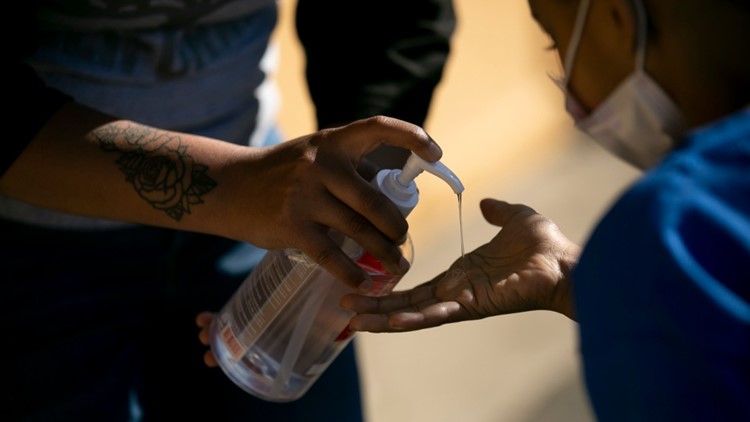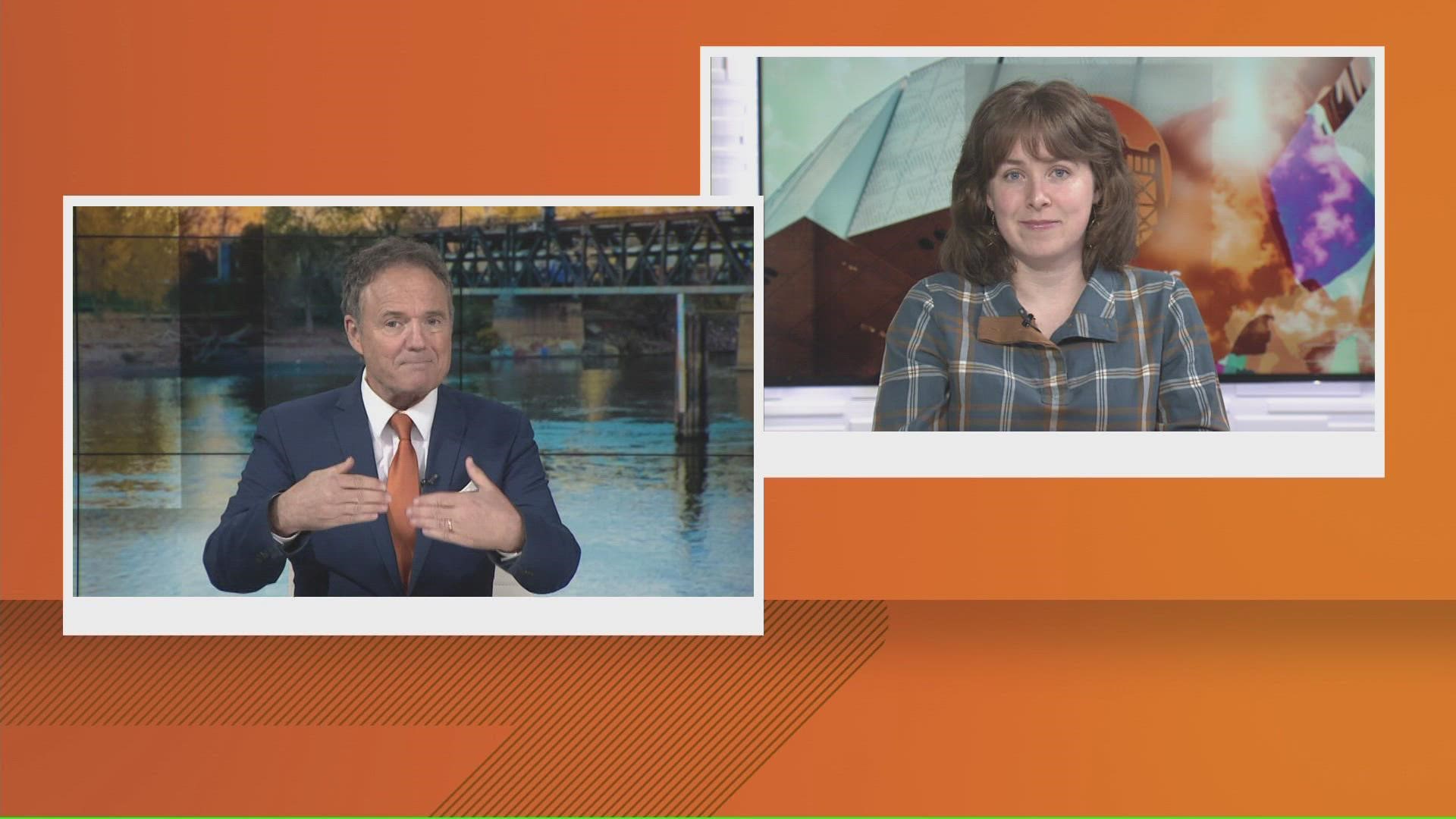SACRAMENTO, Calif. — Maribel Ahumada says she lost her sister and nephew to COVID-19 last December.
So when the vaccine became available this spring she took her 16-year-old triplet sons to the grand opening of a vaccination center at San Pedro High School in Los Angeles so they could all get their shots.
Today, as California confronts another wave of the pandemic, she’s frustrated that school districts aren’t acting with the same urgency. She said vaccinations should “100 percent” be required for teachers.
“The way things are going with COVID and now the delta (variant), it should not be an option,” Ahumada said. “I lost two members of my family. I know COVID is real.”
State lawmakers, however, have yet to issue a vaccine mandate for public school teachers, arguing that a mask mandate, increased ventilation and other existing safety measures are enough.
Legislators have put the decision in the hands of local officials, but most school districts haven’t made vaccination a requirement for teachers either because they’re still exploring the legality of a mandate or there isn’t enough support from local teacher unions. The California Teachers Association is strongly supporting vaccines, but has so far stopped short of endorsing a vaccination mandate for all public school teachers.
Some school districts have settled for the softer alternative of a weekly COVID-19 test, as some are facing advocacy groups that are actively fighting against a vaccination requirement for teachers until the FDA fully authorizes the vaccines.
Fifty-four percent of eligible Californians have been fully vaccinated. Coronavirus positivity rates are skewing towards younger, healthier people resulting in lower rates of hospitalization and death.
At the same time, however, the delta variant is breathing new life into what has become a pandemic of the unvaccinated.
Children under 12 are not yet eligible for the vaccine. Public health experts say students, especially younger children, should be safe from getting COVID-19 at school even if their teachers aren’t vaccinated, as long as everyone on campus wears masks and follows hygiene protocols. In rare instances, young children were diagnosed with multisystem inflammatory syndrome after contracting COVID-19. So far, California has had more than 300 cases of the syndrome and 37 have died nationwide.
But spread among unvaccinated adults at schools could threaten a return to distance learning, which devastated students’ mental health and worsened the academic achievement gap along the lines of race, income and disability.
“The need for children to be back in in-person learning has been well demonstrated,” said Monica Gandhi, a professor of medicine at UC San Francisco. “We should do everything we can to keep students in classrooms, including mandating teacher vaccinations.”
The best defense
Megan Bacigalupi, the executive director of Open Schools California, says school districts should take all precautions to ensure in-classroom instruction all year.
“Vaccination is the way out of this,” she said. “Getting everyone vaccinated protects everyone, including kids.”
Bacigalupi has two kids, a third grader and kindergartener, in the Oakland Unified School District. She said she’s not too worried about her kids’ safety because younger children are less likely to catch or fall seriously ill from COVID-19. But she is worried that high case numbers among teachers would force the district to revert to distance learning.
Most public health experts share Bacigalupi’s concern.
“Those who are vaccinated are much less infectious even with the delta variant,” said Gandhi. “It seems paramount for teachers to be vaccinated.”
In vaccinated individuals who do get infected with COVID-19, Gandhi said, their immune systems are able to greatly reduce the amount of virus in their throats, making it far less likely to spread to others. Considering children are less likely to get seriously ill from COVID-19, unvaccinated adults will be most at risk at schools.
“If we end up with a bunch of sick teachers, we might end up back on Zoom,” said Andrew Noymer, a public health professor at UC Irvine.
Despite these experts urging universal teacher vaccinations, there has been little momentum among state lawmakers. State Sen. Josh Becker, a Democrat who represents sections of San Mateo and Santa Clara counties, has been one of the few calling on districts to require teachers to be fully vaccinated before returning to campuses.
“We’re at a tipping point,” he said. “The delta variant in many ways puts our mindsets back to March 2020. But back then, we did not have the defense.”
Gov. Gavin Newsom on July 26 said that state employees and health care workers must be fully vaccinated or be tested for COVID-19 at least once a week. On Thursday, the California Department of Public Health went a step further and ordered all indoor health care workers to be vaccinated.
When it comes to school employees, however, the governor is also leaving the decision up to local districts. At a Friday press conference at Juanita B. Jones Elementary School in San Bernardino, Newsom said he’s confident that the masking mandate, increased ventilation and other existing safety measures will be enough to keep schools open all year long. But he urged all school employees to get vaccinated.
“We can take these masks off once and for all,” he said. “That way we can keep our kids back in-person without any stress or anxiety for the rest of the year.”
The California Teachers Association is strongly supporting vaccines but has so far stopped short of endorsing a vaccination mandate for all public school teachers. Randi Weingarten, the president of the American Federation of Teachers, the second largest teachers union in the country, said she she would support a vaccination requirement for teachers.
“The circumstances have changed,” she told NBC News. “It weighs really heavily on me that kids under 12 can’t get vaccinated.”
Local approaches
Los Angeles Unified, San Diego Unified and San Jose Unified School Districts are requiring teachers to either show proof of vaccination or be tested at least once a week. San Francisco Unified will not require teachers to be vaccinated, but is asking its employees to provide their vaccination status.
Sweetwater Union High School District in southern San Diego County, which is not requiring teachers to be vaccinated, has had 75 positive cases since its school year started on July 21, mostly among its 37,000 students. Students and staff who came into contact with anyone who tested positive can remain on campus as long as they’re vaccinated and asymptomatic. Unvaccinated students or staff who come into contact can remain on campus as long as they agree to a series of COVID-19 tests over a 10-day period.
Local teachers union president Julie Walker said no serious illness or hospitalizations have been reported to her or the district. She said a vaccine mandate would require negotiations with the district administration. Considering that some teachers do not want to be vaccinated, Walker said it’s unlikely the union would support a mandate.
“I have some very adamant members who don’t want it,” Walker said. “I encourage, but I don’t mandate.”
She said she doesn’t think a requirement is necessary considering the district’s masking rules, contact tracing and testing sites.
Public health experts, however, say there’s no substitute for full vaccination.
“Testing is simply not as good as being vaccinated,” Gandhi said. “Your exposure could have been in between the two times of testing.”
Legal obstacles to requiring teacher vaccination
While many lawmakers, school district officials and teachers unions are all strongly urging school employees to get vaccinated, making it a requirement could open up legal challenges against the state and local districts because none of the COVID-19 vaccines have been fully approved by the U.S. Food and Drug Administration.
Under the vaccines’ current status of “emergency use authorization,” a mandate could be susceptible to legal challenges from employees who refuse, according to Dorit Reiss, a law professor at UC San Francisco.
“We don’t have a lot of cases on this because we’re in a new situation,” said Reiss. “There’s never been a vaccine for the whole population under emergency use authorization.”
But so far, lawsuits related to vaccine mandates at schools and universities have been unsuccessful.
On Aug. 2, a panel of federal judges threw out a lawsuit filed by a group of students against Indiana University’s vaccine mandate. On July 27, a court dismissed a lawsuit against Los Angeles Unified and its requirement that teachers either be vaccinated or undergo weekly testing.
In fact, there’s already precedent for a COVID-19 vaccine mandate in California public higher education. Both the University of California and the California State University systems are requiring faculty, staff and students to be fully vaccinated before they return to campus.
“I am one of thousands of UC and Cal State teaching faculty who are under a vaccine requirement as terms of our employment,” said Noymer, the UC Irvine public health professor. “So it doesn’t seem particularly oppressive to me to require K-12 teachers to vaccinate.”
But local district officials are reluctant to take that step before the vaccines receive full FDA approval. At the very least, district administrators and teachers unions alike want to negotiate what a vaccine mandate might entail.
“We’re certainly in conversation with our unions on how to encourage vaccinations,” said Richard Barrera, president of the San Diego Unified school board. “It’s an evolving conversation.”
Upon FDA approval, Reiss says, the state could mandate vaccines and teachers and their unions would have to comply without bargaining because the order isn’t coming from their employers.
Bacigalupi, the Oakland Unified parent and director of Open Schools California, said districts should absolutely mandate the vaccine once it gets full approval.
“It strikes people as contradictory that there are individuals who would oppose a vaccine mandate, but are completely fine with a mask mandate,” she said.
A return to distance learning unlikely
Public health experts and school district officials do agree that even without a vaccine mandate for school staff, the current spread of COVID-19 and the delta variant will probably not threaten school reopenings in the fall.
Gandhi said as long as schools enforce masking and routine testing, students should be safe on campus.
“Even despite not having any vaccines around, we’ve been able to keep schools open,” she said. “I think the data has shown us that we can reopen safely even during high community spread.”
Scott Borba, superintendent of Le Grand Union Elementary School District in Merced County, said close to 70% of his staff were vaccinated as of the spring. He said he won’t be requiring his staff to submit proof of vaccination. Besides the masking rule, he expects classrooms will feel relatively normal when students return on Aug. 11.
“I’m praying and hoping that we can start the year off normal,” Borba said. “It feels good to be doing education again after a year and a half of being a public health coordinator for my school.”
Ahumada, however, said she’ll pull her sons out of school and into distance learning if she sees too many positive cases among students or staff.
“My sons are desperate to go back,” she said. “But people are still dying. COVID is not gone yet.”



